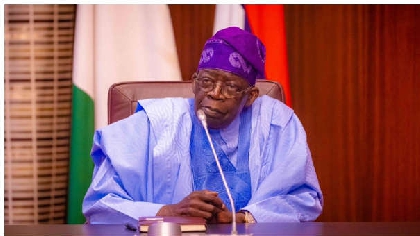Nigeria’s President Bola Tinubu on Monday swore in 45 ministers, the largest so far in the country struggling to tackle poverty, insecurity, a weak currency and high inflation in Africa’s largest economy.
The ceremony took place nearly three months after Tinubu took office on May 29 after winning a disputed presidential election in February which is being challenged by his main opponents in court.
President Tinubu has urged the recently appointed ministers to collaborate with him and each other to fulfill the aspirations of the Nigerian people through their work in government.
Also read: Tinubu names Momoh Niger Delta Minister, reshuffles Ministers-designate
He gave the charge during the inauguration of the 45 confirmed ministers-designate on Monday held at the Conference Centre of the State House, Abuja.
“We are in this boat, even if it is a vehicle and I am the driver, the entire Nigerians are behind sitting and watching as you and I navigate this vehicle. We must hold each other responsible, we have to do the job to meet the expectations of all Nigerians.
“As I said earlier on, you are not a minister of a particular state, colony, region or ethnic nationality, you are a minister of the Federal Republic of Nigeria,” Tinubu said.
The President reminded the newly-sworn Ministers that it is a high honour to be chosen to serve as a minister in the Federal Executive Council and also charged them with teamwork.
He added that the greatest number of Nigerians are expectant of their delivery, accountability and transparency and as well expect them to work with integrity, dignity and deliver.
“With the inauguration of Ministers today, we are about to accelerate our governing efforts to move forward in realizing our best aspiration for Nigeria. It’s all about a great team and I believe we have them here. It is a high honour to be chosen to serve as a minister in the federal executive council of our beloved republic.
“With such high honour comes tremendous responsibility in this moment of abundant promise and peril in equal measure. All of you who have been sworn in have been called to distinguish yourselves. It is me who knows you and delegates this authority but the greatest number of Nigerians are highly expectant of delivery, accountability and transparency.
Tinubu, 71, who is chairman of regional bloc ECOWAS, is working with other heads of government in West Africa to find a solution to the crisis in Niger where a military junta has seized power.
He has embarked on some of the boldest reforms that Nigeria has seen in years, including scrapping a popular but costly petrol subsidy and removing exchange rate restrictions. The naira has weakened to record lows.
The reforms are a gamble to try to kick-start growth but inflation has soared, worsening a cost of living crisis for Africa’s most populous nation. Nigeria will release its second-quarter growth data on Friday, the first after Tinubu initiated the reforms.
Names of new Ministers
The current portfolios include former Rivers State governor Nyesom Wike as Minister of Federal Capital Territory (FCT), Wale Edun (Finance and Coordinating Minister of the Economy), Adegboyega Oyetola (Marine and Blue Economy), David Umahi (Works), Festus Keyamo (Aviation and Aerospace Development), and Betta Edu (Humanitarian Affairs and Poverty Alleviation).
Also among those sworn in are Bosun Tijani (Communications, Innovation and Digital Economy), Ishak Salaco (State, Environment and Ecological Management), Adedayo Adelabu (Minister of Power), Tunisia Alausa (State, Health and Social Welfare), Dele Alake (Solid Minerals Development), Lola Ade-John (Minister of Tourism), Sa’idu Alkali (Transportation), and Bunmi Tunji-Ojo (Interior).
Some others are Doris Anite (Industry, Trade and Investment), Uche Nnaji (Innovation, Science and Technology), Nkiruka Onyejeocha (State, Labour and Employment), Uju Kennedy (Women Affairs), Abubakar Momoh (Niger Delta Development), Ekperikpe Ekpo (State, Petroleum Resources — Gas), and Heineken Lokpobiri (State, Petroleum Resources — Oil).
The new ministers also include John Enoh (Sports Development), Hannatu Musawa (Art, Culture and the Creative Economy), Mohammed Badaru (Defence), Bello Matawalle (State Defence), Yusuf T. Sunumu (State Education), Ahmed M. Dangiwa (Housing and Urban Development), Abdullah T. Gwarzo (State, Housing and Urban Development), and Atiku Bagudu (Budget and Economic Planning).
Also sworn in are Mairiga Mahmud (State, Federal Capital Territory), Bello M. Goronyo (State, Water Resources and Sanitation), Abubakar Kyar (Agriculture and Food Security), Tahir Maman (Education), Yusuf M. Tuggar (Foreign Affairs), Ali Pate (Coordinating Minister of Health and Social Welfare), Ibrahim Geidam (Police Affairs), U. Maigari Ahmadu (State, Steel Development), and Shuaibu A. Audu (Steel Development).
Others are Muhammed Idris (Information and National Orientation), Lateef Fagbemi (Attorney General of the Federation and Minister of Justice), Simon B. Lalong (Labour and Employment), Imaan Sulaiman-Ibrahim (State, Police Affairs), Zephaniah Jisalo (Special Duties and Inter-Governmental Affairs), Joseph Utsev (Water Resources and Sanitation), and Aliyu Sabi Abdullahi (State, Agriculture and Food Security).
Though a Minister of Environment and Ecological Management has yet to be designated, the Presidency assigned the appointment to Kaduna State, an indication that it is being reserved for the as-yet-uncleared Nasir El-Rufai.
Tinubu’s cabinet is bigger than that of his predecessor, Muhammadu Buhari, who had 36 ministers in his first terms and 43 in his second term in office. Under the law, the president must include a member from each of the country’s 36 states.

